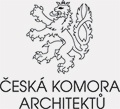
The general assembly of the Czech Chamber of Architects took place
On April 18, 2015, at the Faculty of Architecture of the Czech Technical University in Prague (FA ČVUT), the XXII General Assembly of the Czech Chamber of Architects (ČKA) took place. Over two hundred of its members registered. The main point of the Saturday agenda was a discussion on pressing issues related to the practice of the architect profession. A perennial topic of the annual gathering of architects is the assignment of public contracts, which has gained even more relevance in connection with the recently approved amendment to the Public Procurement Act and the upcoming new law. Significant attention was also traditionally devoted to architectural competitions and the Competition Rules. Elections to the bodies of the ČKA also took place.
The Chamber convenes the General Assembly, as its highest body, at least once a year. Its main tasks include electing new members to the self-governing bodies, approving internal regulations or their changes, and endorsing the budget and the proposed activities of the ČKA for the upcoming period. The meeting of all authorized architects serves as a platform for discussing the issues of the architect profession and possible solutions, proposing, and potentially approving documents that should stimulate public administration. It is also possible to assign specific tasks to the ČKA board in the final resolution of the General Assembly for the following year.
An annual component of the General Assembly is also the exhibition of the Review of Diploma Theses. Works by students that advanced to the second round in last year's jubilee XV. edition were presented. Another event where the Chamber will exhibit them is the traditional Architects on One Boat, which will take place on June 16.
Tomáš Sklenář from the Ministry of Regional Development stated that the Chamber was involved in all significant legislative changes that the Government of the Czech Republic addressed in the past year. The active role of the ČKA became evident, especially in the process of commenting on the Architecture and Building Culture Policy of the Czech Republic, which was approved by the government in mid-January 2015. The position of the Chamber among partners from public administration was further strengthened at the end of last year by the fact that all professional chambers established by law became official commenting bodies for affected laws. Thus, the ČKA now participates directly in the deliberation of all laws and their amendments that fall under its jurisdiction.
A current issue that the ČKA, in cooperation with the ČKAIT and the Ministry of Regional Development, is addressing is the problem of the lowest price, particularly in relation to the new Public Procurement Act. The priority of joint work on fees that would provide investors with guidance for selecting a quality contractor for the project was confirmed at the General Assembly by ČKAIT Chairman Pavel Křeček. The first real result of the cooperation between both chambers is a program for determining the estimated value of a public contract - the prices of project works for building construction and landscape construction, which is published on the ČKA website. The "calculator," based on criteria established by experts in the fields of architecture and construction, can distinguish a well-prepared contract from an undervalued one and thus help avoid additional costs during construction. The program is now available to ČKA members on the intranet, but the Chamber anticipates its further dissemination primarily among public procurers.
Architects appreciated the increase in the number of competitions, but many pointed out that the Chamber must ensure their quality. The foundation of a successful architectural competition, from which both the organizer and the public will benefit, is mainly a well-trained expert jury. The ČKA has published a list of recommended jury members on its website. These members should also newly have completed references in the form of completed training or a list of competitions in which they served on the expert jury. This provides further assistance to public procurers. It should be noted that the ČKA currently offers its members the opportunity to create a similar profile on its portal, where they present their architectural work. These profiles are available in the Architecture World section.
Other discussed points included targeted support for young architects and their motivation to join the Chamber. The ČKA is currently collaborating with universities that teach architecture and related fields through a working group for education and also as part of the Review of Diploma Theses, which has been held for the sixteenth year. The General Assembly of the ČKA agreed that this coordination of the Chamber's activities with universities should be further deepened.
The General Assembly also appreciated the ČKA's activity as a provider of a platform for professional discussion on current issues concerning architecture, construction, and planning in urbanism. A recent such event was the Open Architect Think Tank (OTTA) on the topic of the railway station in Brno, which took place last week in Brno and drew enormous interest from architects, urban planners, transportation engineers, and also the public. The event was attended by over a hundred participants. In this context, the General Assembly suggested that the Chamber offer space for a similar professional discussion regarding the Prague construction regulations in the coming weeks.
Architects also assigned a significant role to heritage preservation. This should be strengthened by re-establishing a specialized working group that will be responsible not only for the heritage law but also for deepened cooperation with the National Heritage Institute in the protection of endangered objects that should be heritage-protected. The ČKA thus logically continues its previous activities, during which it advocated for the protection of several significant buildings (the Uran department store, the railway station in Havířov, or Slezan in Frýdek-Místek).
The following were elected to the board of the ČKA:
Pavel Hnilička (119 votes, Prague region)
Milan Svoboda (137 votes, Bohemian region)
Karel Cieślar (110 votes, Moravia and Silesia region)
Petr Velička (96 votes, Moravia and Silesia region)
The following remain in the board: Radek Kolařík, Milan Košař, Pavel Martinek, Ivan Plicka, Klára Salzmann, Radim Václavík, Michal Volf, and Jaroslav Šafer.
The following were elected to the supervisory board of the ČKA:
Miroslav Holubec (107 votes, Prague region)
Josef Patrný (127 votes, Bohemian region)
Pavel Rada (167 votes, Moravia and Silesia region)
The following remain in the supervisory board: Lucie Chytilová, Jana Kaštánková, Miroslav Kopecký, David Mikulášek, Martin Rusina, and Václav Zůna.
The following were elected to the Chamber Court:
David Mateásko (176 votes)
Karel Doležel (133 votes)
Tomáš Vích (103 votes)
In the Chamber Court remain: Petr Krejčí, Marek Janatka, Luděk Jasiok, Milan Nytra, Josef Vrana, and Václav Šebek.
The chairpersons and vice-chairpersons of all bodies (the board of the ČKA, the supervisory board, and the Chamber Court) will be elected at the upcoming meetings according to the Organizational, Election, and Meeting Rules of the ČKA.
The Chamber convenes the General Assembly, as its highest body, at least once a year. Its main tasks include electing new members to the self-governing bodies, approving internal regulations or their changes, and endorsing the budget and the proposed activities of the ČKA for the upcoming period. The meeting of all authorized architects serves as a platform for discussing the issues of the architect profession and possible solutions, proposing, and potentially approving documents that should stimulate public administration. It is also possible to assign specific tasks to the ČKA board in the final resolution of the General Assembly for the following year.
An annual component of the General Assembly is also the exhibition of the Review of Diploma Theses. Works by students that advanced to the second round in last year's jubilee XV. edition were presented. Another event where the Chamber will exhibit them is the traditional Architects on One Boat, which will take place on June 16.
ČKA and its role in the legislative process
This year's guests at the General Assembly included, for example, the Director of the Department of Urban Planning of the Ministry of Regional Development, Tomáš Sklenář, the Director of the Department of Construction and Building Materials of the Ministry of Industry and Trade, Petr Serafín, the Chairman of the Czech Chamber of Authorized Engineers and Technicians Active in Construction (ČKAIT), Pavel Křeček, the President of the Czech Union of Civil Engineers, Pavel Štěpán, and the President of the Building Council (SIA), Jan Fibiger.Tomáš Sklenář from the Ministry of Regional Development stated that the Chamber was involved in all significant legislative changes that the Government of the Czech Republic addressed in the past year. The active role of the ČKA became evident, especially in the process of commenting on the Architecture and Building Culture Policy of the Czech Republic, which was approved by the government in mid-January 2015. The position of the Chamber among partners from public administration was further strengthened at the end of last year by the fact that all professional chambers established by law became official commenting bodies for affected laws. Thus, the ČKA now participates directly in the deliberation of all laws and their amendments that fall under its jurisdiction.
A current issue that the ČKA, in cooperation with the ČKAIT and the Ministry of Regional Development, is addressing is the problem of the lowest price, particularly in relation to the new Public Procurement Act. The priority of joint work on fees that would provide investors with guidance for selecting a quality contractor for the project was confirmed at the General Assembly by ČKAIT Chairman Pavel Křeček. The first real result of the cooperation between both chambers is a program for determining the estimated value of a public contract - the prices of project works for building construction and landscape construction, which is published on the ČKA website. The "calculator," based on criteria established by experts in the fields of architecture and construction, can distinguish a well-prepared contract from an undervalued one and thus help avoid additional costs during construction. The program is now available to ČKA members on the intranet, but the Chamber anticipates its further dissemination primarily among public procurers.
Architectural competitions remain a priority
In addition to the establishment of fees, the fundamental role of architectural competitions has been reaffirmed. The Chamber manages to increase the number of competitions every year. However, with the growing number, the organizers of these competitions are contacting the Chamber with requests for exemptions from the Competition Rules, mainly concerning the amount of prizes and rewards. Architectural competitions that do not comply with the Competition Rules are labeled as irregular, and according to the Professional and Ethical Code of the ČKA, authorized architects must not participate in them. A significant part of the discussion thus focused on the possibility of a middle ground that would allow the participation of authorized architects in selected competitions, even if the competition did not fully comply with the ČKA conditions.Architects appreciated the increase in the number of competitions, but many pointed out that the Chamber must ensure their quality. The foundation of a successful architectural competition, from which both the organizer and the public will benefit, is mainly a well-trained expert jury. The ČKA has published a list of recommended jury members on its website. These members should also newly have completed references in the form of completed training or a list of competitions in which they served on the expert jury. This provides further assistance to public procurers. It should be noted that the ČKA currently offers its members the opportunity to create a similar profile on its portal, where they present their architectural work. These profiles are available in the Architecture World section.
Other discussed points included targeted support for young architects and their motivation to join the Chamber. The ČKA is currently collaborating with universities that teach architecture and related fields through a working group for education and also as part of the Review of Diploma Theses, which has been held for the sixteenth year. The General Assembly of the ČKA agreed that this coordination of the Chamber's activities with universities should be further deepened.
The General Assembly also appreciated the ČKA's activity as a provider of a platform for professional discussion on current issues concerning architecture, construction, and planning in urbanism. A recent such event was the Open Architect Think Tank (OTTA) on the topic of the railway station in Brno, which took place last week in Brno and drew enormous interest from architects, urban planners, transportation engineers, and also the public. The event was attended by over a hundred participants. In this context, the General Assembly suggested that the Chamber offer space for a similar professional discussion regarding the Prague construction regulations in the coming weeks.
Architects also assigned a significant role to heritage preservation. This should be strengthened by re-establishing a specialized working group that will be responsible not only for the heritage law but also for deepened cooperation with the National Heritage Institute in the protection of endangered objects that should be heritage-protected. The ČKA thus logically continues its previous activities, during which it advocated for the protection of several significant buildings (the Uran department store, the railway station in Havířov, or Slezan in Frýdek-Místek).
Elections to the bodies of the Chamber
Elections to the bodies of the ČKA also took place at the XXII General Assembly. Just like last year, the elected candidates attracted their voters mainly with continuous cooperation with the Chamber, as many of them served in various bodies of the ČKA or its working groups. The board was strengthened, for example, by Milan Svoboda and Petr Velička, who will complement Klára Salzmann, elected the previous year, in the field of landscape architecture. Both are also very actively involved in architectural competitions. Milan Svoboda works directly in the working group for competitions, and Petr Velička has rich experience as a jury member and a successful participant in several architectural competitions. Pavel Hnilička defended the position for the Prague region, and new reinforcement for the Moravian-Silesian section is architect Karel Cieślar.The following were elected to the board of the ČKA:
Pavel Hnilička (119 votes, Prague region)
Milan Svoboda (137 votes, Bohemian region)
Karel Cieślar (110 votes, Moravia and Silesia region)
Petr Velička (96 votes, Moravia and Silesia region)
The following remain in the board: Radek Kolařík, Milan Košař, Pavel Martinek, Ivan Plicka, Klára Salzmann, Radim Václavík, Michal Volf, and Jaroslav Šafer.
The following were elected to the supervisory board of the ČKA:
Miroslav Holubec (107 votes, Prague region)
Josef Patrný (127 votes, Bohemian region)
Pavel Rada (167 votes, Moravia and Silesia region)
The following remain in the supervisory board: Lucie Chytilová, Jana Kaštánková, Miroslav Kopecký, David Mikulášek, Martin Rusina, and Václav Zůna.
The following were elected to the Chamber Court:
David Mateásko (176 votes)
Karel Doležel (133 votes)
Tomáš Vích (103 votes)
In the Chamber Court remain: Petr Krejčí, Marek Janatka, Luděk Jasiok, Milan Nytra, Josef Vrana, and Václav Šebek.
The chairpersons and vice-chairpersons of all bodies (the board of the ČKA, the supervisory board, and the Chamber Court) will be elected at the upcoming meetings according to the Organizational, Election, and Meeting Rules of the ČKA.
The English translation is powered by AI tool. Switch to Czech to view the original text source.
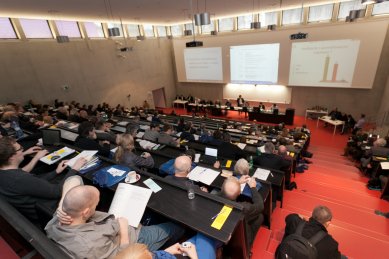
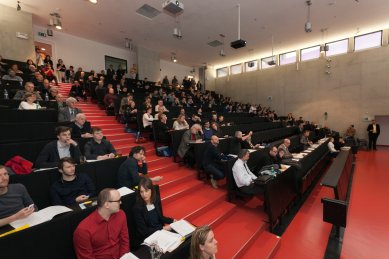
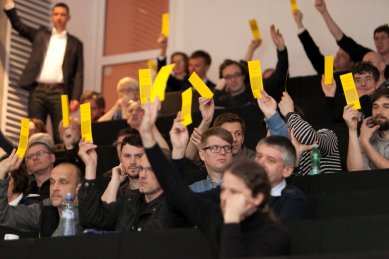
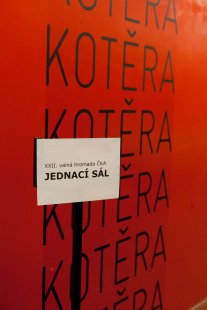
11 comments
add comment
Subject
Author
Date
Valná hromada ČKA
účastník
22.04.15 09:18
Co dál?
Pavel
22.04.15 11:23
nechutná VH
josef smutný
23.04.15 03:08
potřebnost komory?
mladý architekt
27.04.15 10:40
Re: mladý architekt
neautorizovany
27.04.15 07:08
show all comments


